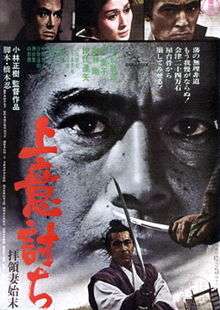Samurai Rebellion
Samurai Rebellion (上意討ち 拝領妻始末, Jōi-uchi: Hairyō tsuma shimatsu) is a 1967 Japanese jidaigeki film directed by Masaki Kobayashi. The film is based on Hairyozuma shimatsu by Yasuhiko Takiguchi.[1]
| Samurai Rebellion | |
|---|---|
 Theatrical poster for Samurai Rebellion | |
| Directed by | Masaki Kobayashi |
| Produced by | |
| Screenplay by | Shinobu Hashimoto[1] |
| Based on | Hairyozuma shimatsu by Yasuhiko Takiguchi |
| Starring |
|
| Music by | Toru Takemitsu[1] |
| Cinematography | Kazuo Yamada[1] |
| Edited by | Hisashi Sagara[1] |
Production companies | |
| Distributed by | Toho |
Release date |
|
Running time | 128 minutes[1] |
| Country | Japan |
Its original Japanese title is Jōi-uchi: Hairyō tsuma shimatsu. Donald Richie suggests an approximate translation, "Rebellion: Receive the Wife".[2]
Plot
In the Edo period of Japan, in the year 1725, Isaburo Sasahara (Toshiro Mifune) is a vassal of the daimyō of the Aizu clan, Masakata Matsudaira. Isaburo is one of the most skilled swordsmen in the land, whose principal rival is his good friend Tatewaki Asano (Tatsuya Nakadai). Isaburo is in a loveless marriage with a shrew of a woman. One day, one of the daimyo's advisors orders Isaburo's elder son Yogoro (Go Kato) to marry the daimyo's ex-concubine, Ichi (Yoko Tsukasa), even though she is the mother to one of the daimyo's sons. With much trepidation, the family agrees. In time, Ichi and Yogoro find love and happiness in the marriage and a daughter, Tomi, is born.
However, the daimyo's primary heir dies, and he orders his ex-concubine to rejoin his household to care for their son and heir. The family refuses, but Ichi is tricked into the castle by Isaburo's younger son, and her husband and father-in-law are ordered to commit seppuku for their insolence and insubordination. Isaburo counters that he will comply only if the heads of the daimyo and his two primary advisors are brought to him first. Isaburo sends his younger son and wife away and dismisses his household servants. With his elder son, he prepares for battle, removing the tatami from his house to prevent slipping in the blood that will be spilled and removing the house's walls to allow for more space for combat.
The daimyo's steward, accompanied by a platoon of 20 samurai, brings Ichi to the Sasahara house and tries to force her at spear point to renounce her marriage to Yogoro and join the daimyo's household. The daimyo also "graciously" offers to commute Isaburo and Yogoro's sentences to life confinement in a shrine outside his castle. Not only does Ichi refuse to join his household, she throws herself onto a spear instead of abandoning her husband. Her husband goes to her side and is killed with her in his arms. His father, enraged, kills the steward's entire party, killing the steward last as he attempts to flee.
Burying the dead couple, Isaburo now decides to take his case to the Shogun in Edo regardless of the consequences to his clan, accompanied by Tomi. Tatewaki, who is guarding the gate, cannot permit Isaburo to pass, and a climactic duel follows with his good friend. Isaburo is the victor, but assassins hidden nearby cut Isaburo down with musket fire. In his dying breath, he laments that no one will ever know the love story of Yogoro and Ichi, which had inspired him, an otherwise obedient vassal, to rise against his clan and lord. He beseeches Tomi to be a good and kind woman like her mother, and to seek out a fine and kind husband like her father. As Isaburo dies, we see Tomi's wet-nurse comforting the baby: she has been secretly following him.
Cast
- Toshiro Mifune as Isaburo Sasahara
- Yoko Tsukasa as Ichi Sasahara
- Go Kato as Yogoro Sasahara
- Tatsuya Nakadai as Tatewaki Asano
- Shigeru Koyama as Geki Takahashi
- Masao Mishima as Sanzaemon Yanase
- Isao Yamagata as Shobei Tsuchiya
- Tatsuyoshi Ehara as Bunzo Sasahara
- Etsuko Ichihara as Kiku
- Tatsuo Matsumura as Masakata Matsudaira
- Takamaru Sasaki as Kenmotsu Sasahara
- Jun Hamamura as Hyoemon Shiomi
Music
The music, by Tōru Takemitsu, is performed almost exclusively on traditional Japanese instruments, including shakuhachi, biwa, and taiko.
Release
Samurai Rebellion received a roadshow release in Japan on 27 May 1967 where it was distributed by Toho.[1] The film received a wide theatrical release in Japan on 3 June 1967.[1] The film was released by Toho International with English-subtitles and a 120-minute running time in December 1967.[1] It has been released to home video under the title of Samurai Rebellion.[1]
Awards
Samurai Rebellion received awards in Japan, including Kinema Junpo awarding it Best Film, Best Director (Kobayashi), Best Screenplay (Shinobu Hashimoto (also for The Emperor and the General)).[1] Mainichi Film Concours awarded it as Best Film of the year.[1] Along with China is Near, it won the FIPRESCI Prize at the Venice Film Festival.[1]
References
- Galbraith IV 2008, p. 239.
- Richie, Donald. "Samurai Rebellion: Kobayashi's Rebellion". Criterion Collection. Retrieved 28 May 2017.
Sources
- Galbraith IV, Stuart (2008). The Toho Studios Story: A History and Complete Filmography. Scarecrow Press. ISBN 1461673747. Retrieved October 29, 2013.
External links
- Samurai Rebellion on IMDb
- Samurai Rebellion at Rotten Tomatoes
- Samurai Rebellion at AllMovie
- "上意討ち 拝領妻始末 (Jōi-uchi: Hairyō tsuma shimatsu)" (in Japanese). Japanese Movie Database. Retrieved 2007-07-17.